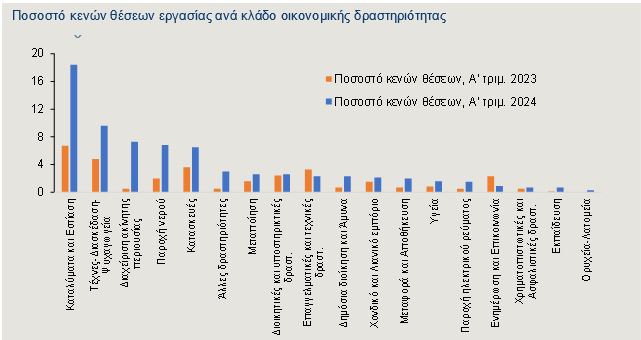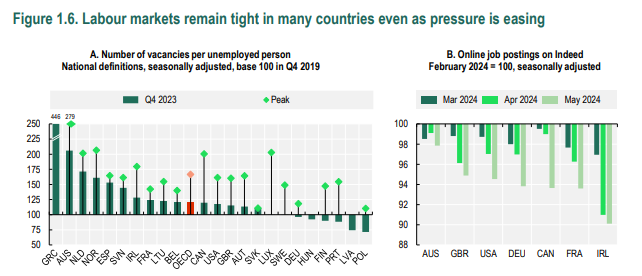![Greek Economy: How Job Vacancies Are Undermining Growth – What Do Experts Say? [γραφήματα] – Financial Postman Greek Economy: How Job Vacancies Are Undermining Growth – What Do Experts Say? [γραφήματα] – Financial Postman](https://www.ot.gr/wp-content/uploads/2024/07/ergasia-1-768x480-1.jpg)
The job gaps in Greece are developing into a dying wound for the Greek economy, which is getting bigger and bigger. So, at a time when the Greek economy is in a development phase, this very serious issue becomes an additional obstacle, keeping the Greek GDP in a “low-flying” state.
The fact is that the intensification of the “tightness” of the labor market (labor market tightness), which is expressed by a continuous increase in the percentage of job vacancies, together with a simultaneous decrease in the unemployment rate, limits the available potential labor force and causes additional problems.
There is no doubt that the low wages of workers and scientific specialists are the reason that raises concerns about the course of the Greek economy.
Economy: A thorn in the side of job vacancies and plans to boost employment
“Bell for the Greek Economy
The Governor of the Bank of Greece, Yannis Stournaras, sounded the alarm about the very large shortage of workers, stressing that if immediate efforts are not made to fill the nearly 200,000 vacancies that exist today, “we will find the problem in front of us.”
As Yannis Stournaras often points out in an article in the Parliament’s annual issue of Postcolonialism, “We lack manpower for activities related to tourism, agriculture and construction. If we do not find them immediately, we will start to have problems in the economy as well.” Finance Minister Kostis Hatzidakis says that “real convergence of incomes with the EU average is now the big challenge.”
Greek Economy: In Which Sectors Are the Gaps?
As it turns out, the gaps are… chaotic and extend to a number of industries. As a recent Alfa Bank report showed, the highest vacancy rates in the first quarter of 2024 were recorded in the accommodation and restaurant industries (18.4%), the arts (9.6%), property management (7.3%), water supply (6.8%) and construction (6.5%).
It is worth noting that the vacancy rate in the accommodation and restaurant sector is the highest in the EU27, followed by the Czech Republic (8.1%), while in the Mediterranean countries, where tourism contributes decisively to economic activity, the corresponding vacancy rates are much lower (Spain: 0.5%, France: 4.9%, Italy 5.3%, Portugal: 1.7%, Croatia 4.9%, Cyprus 7.8%). In addition, vacancies in property management and construction are the second and fourth highest in the EU27, respectively.
Lowest employment rate since 2008
However, the problem also lies in the still low level of employment. The unemployment rate, in May 2024, continued its downward trend to reach 10.6%, almost back to the levels of December 2009 (10.5%). However, it should be noted that since the beginning of last year the unemployment rate has declined at a more moderate pace compared to the decline recorded from around mid-2021 to early 2023.
Meanwhile, employment has been rising steadily since April 2021, with the exception of two months in 2023.
According to the latest data, employment recorded an annual increase of 1.3% in May 2024, while the number of employed people reached about 4.25 million people, returning to similar levels at the end of 2010. However, the number of employed people decreased by about 371 thousand from the highest level recorded in October 2008!
Mismatch of qualifications and demand
An additional factor to highlight is the mismatch between the skills available to the workforce and the qualifications required by companies. This fact is more widely known in the business world and can be seen in the OECD Skills Mismatch Index. In this specific index, Greece has a much higher deviation from Europe of “27” compared to similar economies such as Italy, Spain and Portugal.
The number of job vacancies in Greece jumped after 2019, much more than in OECD countries, according to a report by the Employment Outlook.
It is noteworthy that during the fourth quarter of 2023, job vacancies per unemployed person increased more than fourfold in Greece, with the relative index reaching 446 units, based on 100 units in the fourth quarter of 2019.
Also, while job vacancies in other countries were lower at the end of 2023 than their highs, they were still on the rise in Greece.
The results of the survey conducted by EY Hellas, OPA and Endeavor Greece were also revealing, showing that only 1 in 5 university graduates have the skills that companies require. It is worth noting that this particular lag is not theoretical and has real-world implications.
After all, OPA professor Giorgos Dokidis pointed out quite meaningfully that in order to reach a GDP of €300 billion, we need 50,000 STEM graduates per year.

“Avid problem solver. Extreme social media junkie. Beer buff. Coffee guru. Internet geek. Travel ninja.”







More Stories
“Recycling – Changing the water heater”: the possibility of paying the financing to the institution once or partially
Libya: US General Meets Haftar Amid Tensions Between Governments
New tax exemption package and incentives for business and corporate mergers..